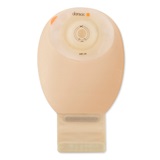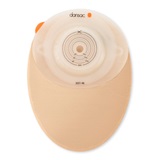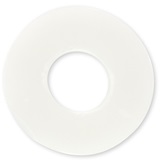A Q&A with Shelley Lawes

In recent months, we’ve been talking a lot about the effect of stoma surgery on mental well-being. Someone who understands this topic better than most is Shelley Lawes.
After suffering for several years at the hands of Ulcerative Colitis, it simply became too much to bear. Shelley was going to the toilet 30 times a day, and found no respite from the medication given to her by health professionals. It was a terrifying time.
Thankfully, everything changed the moment she elected for stoma surgery. Today, Shelley is happy, healthy, and an advocate for helping ostomy patients get the attention they deserve. She also helps others come to terms with their condition by writing a regular online blog.
We sat down with Shelley to discuss what her mental state was like in the years leading up to surgery, and how life has since changed for the better.
Hi Shelley, could you start by telling us a bit about your situation pre-surgery?
Sure. I was diagnosed with Ulcerative Colitis in late 2005. I didn’t really get started on any treatment until 2006, after which it was a long period of medications and mishaps that led to me having surgery.
At the start, the inflammation in my rectum was only very mild — known as Proctitis. As such, the consultant I started seeing said it was manageable, and that I could get on with life in the hope that it would go away. Little did I know, however, that it was chronic, and something that would never completely disappear.
I needed a fix. I needed an answer. So, I opted for an elective operation. I chose it for the benefit of my mental health more than anything. I wasn’t coping — I got to the point where I was having suicidal thoughts; so I had to do it to give my family and me a chance, basically.
What’s it like trying to find a medication that works?
I was in a pressurised job at the time and was suddenly becoming more aware of the flare-ups — which were increasing by the day. My consultant upped my medication and started to give me Mesalazine. Unfortunately, it did nothing to help. I then spent an extended period on and off steroids.
There was no such thing as IBD nurses 15 years ago, which we’re now lucky to have across the country. So, if I was flaring, and I was poorly, I would have to go to my GP. They would then refer me to a consultant, where I’d have to wait for an appointment. During this time, I’d be going to the loo around 30 times a day and experiencing continual bleeding.
Did the steroids help at all?
I was experiencing malabsorption issues, dietary issues, poor sleep, vitamin deficiencies — everything that comes with part of this disease. My worst period was after I gave birth to my first child; I flared up really badly. I was left quite severely anaemic after the birth, and they didn’t get me in quick enough to have infusions. So, I spent a hell of a lot of time feeling very unwell and fatigued.
The problem was that I would wait 12 weeks for an appointment, and the option was always to give me steroids. The steroids would settle the disease down enough that by the time I saw the consultant, they wouldn’t know the extent of the inflammation. That was a cycle that went on for about three years.
It’s a medication you can’t stay on long-term. It has a lot of harmful side effects, such as weight gain, fluid redistribution, sweats, palpitations, thinning of the skin, mood swings, etc. We call steroids “the devil's tic-tacs” in the inflammatory bowel disease community, because you’ve got a love-hate relationship with them. You needed them, but you didn’t want them.
I took it upon myself to go to a new hospital. From then on, I felt listened to and supported. After talking about medication, my new consultant said, “you want surgery, don’t you?” And I said “yes.” I was pleased to hear that he had already arranged a meeting with the surgeon. I was booked in for elective surgery three months later.
Did you see an instant difference in your well-being post-surgery?
I woke up and instantly felt different. It was a fantastic feeling not to have that diseased organ in my body. I was very upbeat, very positive. I actually had a wonderful stay in the hospital. Within six days, I was home. Within five weeks, I was back to doing a lot of ordinary things — even roller derby, which is a sport I played before my surgery.
I could swim. I could drink again. I could eat. It was pretty straightforward in the sense that there was no extra inflammation anywhere; there were no narrowings, no scar tissue, because I hadn’t had previous surgeries. In fact, on day three in the hospital, I was eating a full English breakfast!
How did it feel to have control over your incontinence?
It’s incredible not being tied to incontinence. I’m still incontinent, technically, but I have control over it. Whereas before, I couldn’t even go out for fear of accidents and pain. I wasn’t the type of person to get embarrassed, but it was the fact that I could now control it and have a bit of dignity. Of course, I still have all the different manifestations — the fatigue and other inflammatory issues — however, it has made an enormous difference to how I manage my life now.
Were you given any dietary advice?
I was given a big list of does and don’ts, but, for me, it’s all trial and error. Everybody’s different. You just have to use your common sense; listen to your body and see what causes you gas and discomfort. You have to work that all out for yourself. The list given to you can be scary, especially when the thought of managing a stoma is weighing on your mind. I chose to just listen to my body.
What kind of support did you receive post-surgery?
It was pretty good at the hospital. The stoma nurses were there for me throughout my stay, and the consultant saw me a few times. After the surgery, I was given my kit and linked up with Dansac straight away. I’ve always used them from the beginning. So, I was given a good explanation as to how to use the products.
I was also fortunate to call on friends in online support groups. I already had some friends that had sent me products and bought me boxes of stuff that I could try. Fortunately, what I started with has always worked for me. So, I haven’t had to change it. I’ve tried other things and thought, “Nope, I’ll stick to what I know and what’s great.”
When I came home, I was transferred over to the local stoma nurse team, who came out to see me. They did things like check my stitches and the bottom wound. I also had my drain removed at home because it got clogged. I got everything that I needed. I didn’t always see my stoma nurses because I necessarily had to — I just knew they were there for support.
Even with the support, it must have felt overwhelming. So, what did you do to manage your well-being during this time?
I have three ways that I deal with well-being issues. The first is calling on my very close friends who also live with stomas. I know that when my anxiety is bad, or if I’m struggling, I can speak to them and feel instantly better. You have to keep talking. It doesn’t matter how long you’ve had it, how well you cope with it. Some days are just not going to be okay, and you have to talk.
The second one is merely taking care of myself. Rest, baths, personal hygiene, etc. It’s just making sure you get up, have a shower, and groom yourself. Even if you’re not going anywhere — these little things can be a massive difference to your well-being. My blogging also helps to keep me busy. I feel like it gives me purpose knowing that I have helped other people.
Finally, it’s knowing that I can ask people for help with my children. I’m not naturally maternal. My partner is great at offering support, while my mother-in-law is also incredible. So, knowing that I can reach out and say, “I need you to help me with the children because I just need some space,” is fantastic. And being honest with the kids as well. I’ve been honest with them from day one about my illness, and they are so understanding.
Is it true that you also do advocacy work?
Yes. The reason for doing it is because I want to teach people to be their own advocates. I want them to know that it’s okay to put your foot down and tell health professionals what you want and expect. After all, it’s your health and nobody else’s. For too long, I was this person at the end of the phone, waiting for the decisions to be made. I felt like there was a hierarchy, and I had to wait because they’re the clinicians. I’m trying to help patients get the attention they deserve.
What were some of your biggest challenges surrounding body image?
Surprisingly, my changing body image never phased me. It was more my partner; he was apprehensive about how it was going to affect me. Not that he wouldn’t find my attractive or anything like that. It was more of a fear of somebody cutting me up and that kind of thing. However, once the surgery was done, he was fine. My stoma has never, ever phased me image-wise. In fact, I think I became more body confident because I felt empowered.
I made sure that I told everybody I knew what I was having. I’ve always been very open. I think there wasn’t even a second for anyone to think, “Oh, that’s disgusting.” I believe knowledge is power in this case.
How did surgery affect your social life?
The disease definitely impacted my social life before having surgery. It was very isolating. I couldn’t always plan things, and I’d have to bail out at the last minute. I remember having to say on nights, “I’ve got to go home, I’ve had an accident.”
Eating out was always disastrous. Going shopping was disastrous. I couldn’t go anywhere without having some kind of attack while I was out. So, yeah, I always had a tiny circle that understood the situation. Travelling as well. I wouldn’t have felt comfortable being at an airport or on a train for long periods. Because once you’re on there, you’ve got to deal with the problem.
Post-surgery, everything’s been much more straightforward. Social wise, it’s great. My illness before, people couldn’t see it, and they could only take my word. But now I’ve got this thing on me, it gives them a visual to say, “Okay. You really were poorly, and this is serious.”
My stoma has given me a whole new world of incredible people online, and I’m so grateful. For instance, I wouldn’t have met my best friend now of five years if I hadn’t had surgery. So, for me, it’s been made worthwhile. I wouldn’t change being ill or having surgery at all.
Is there any advice that you’d give to other people thinking of having elective stoma surgery?
I suppose my first bit of advice would be to seek out support online. Once you find a community, it becomes easier to ask questions. It will help to decide whether surgery is the right option and how you want to proceed afterwards.
Don’t be so daunted by surgery. It doesn’t have to be negative; there are so many of us that have had to adjust. And so many of us have had surgery because we wanted to. There was always this attitude in leaflets and online that surgery was seen as a last resort for people with certain conditions. Instead, it should be seen as a viable treatment option.
To some people, I think it’s scary the thought that they can’t change their minds and go back. But a lot of people that have J pouches do end up having a permanent stoma anyway.
Likewise, if you knew someone was struggling with poor mental health post-surgery, what would you say?
I’d advise looking into why they have poor mental health. Is it to do with body image? Is it because their stoma is not well managed? Have they got skin issues? Are their products not working for them? I believe finding the root of what’s causing those feeling is the best way to go, because these kinds of things can be resolved.
They should also talk to someone. The best people to speak to include online communities, bag providers, and stoma nurses. Don’t hide it; don’t just get on with it. If your skin’s bad or you keep getting leaks, ask for help. You are 100 percent entitled to live well with your stoma.
Remember, rarely, there isn’t a solution.
Finally, what does the future hold for you?
I think just more of the same. I hope my future is just peaceful. I’m at the point of acceptance now of what’s happened in my life, and I wish to enjoy it as best I can. I don’t want to try to be some superhero. I don’t want to be somebody that I’m not. I’m not the kind of person to start going on major bike rides, running 5K, climbing mountains, etc. So, it’s merely the acceptance of who I am.
I’m not the person I used to be, and I’m grateful for that. I don’t think I would be so content and settled as a person if it weren’t for my disease.
- 4 Shares
- 24 Recommended





